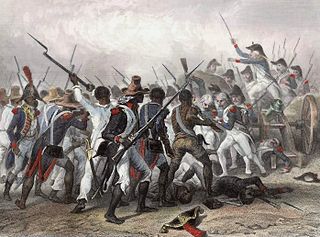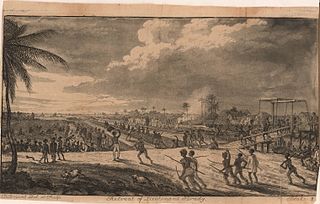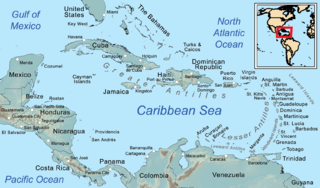Barbados is an island country in the southeastern Caribbean Sea, situated about 100 miles east of Saint Vincent and the Grenadines. Roughly triangular in shape, the island measures some 21 miles from northwest to southeast and about 14 miles from east to west at its widest point. The capital and largest town is Bridgetown, which is also the main seaport.

Manumission, or enfranchisement, is the act of freeing slaves by their owners. Different approaches to manumission were developed, each specific to the time and place of a particular society. Historian Verene Shepherd states that the most widely used term is gratuitous manumission, "the conferment of freedom on the enslaved by enslavers before the end of the slave system".

The Barbados Slave Code of 1661, officially titled as An Act for the better ordering and governing of Negroes, was a law passed by the Parliament of Barbados to provide a legal basis for slavery in the English colony of Barbados. It is the first comprehensive Slave Act, and the code's preamble, which stated that the law's purpose was to "protect them [slaves] as we do men's other goods and Chattels", established that black slaves would be treated as chattel property in the island's court.

Bussa's rebellion was the largest slave revolt in Barbadian history. The rebellion takes its name from the African-born slave, Bussa, who led the rebellion. The rebellion, which was eventually defeated by the colonial militia, was the first of three mass slave rebellions in the British West Indies that shook public faith in slavery in the years leading up to the abolition of slavery in the British Empire and emancipation of former slaves. It was followed by the Demerara rebellion of 1823 and by the Baptist War in Jamaica in 1831–1832; these are often referred to as the "late slave rebellions".

Barbadian nationality law is regulated by 1966 Constitution of Barbados, as amended; the Barbados Citizenship Act, as amended; and various British Nationality laws. These laws determine who is, or is eligible to be, a national of Barbados. Barbadian nationality is typically obtained under the rules of jus sanguinis, i.e. by birth to a father or in some cases, a mother, with Barbadian nationality. It can also be granted to persons with an affiliation to the country, or to a permanent resident who has lived in the country for a given period of time through naturalisation. There is currently no program in Barbados for citizenship by investment, though they do have a special work visa program. Nationality establishes one's international identity as a member of a sovereign nation. Though it is not synonymous with citizenship, rights granted under domestic law for domestic purposes, the United Kingdom, and thus the commonwealth, has traditionally used the words interchangeably.
Slavery at common law in the British Empire developed slowly over centuries, and was characterised by inconsistent decisions and varying rationales for the treatment of slavery, the slave trade, and the rights of slaves and slave owners. Unlike in its colonies, within the home islands of Britain, until 1807, except for statutes facilitating and taxing the international slave trade, there was virtually no legislative intervention in relation to slaves as property, and accordingly the common law had something of a "free hand" to develop, untrammeled by the "paralysing hand of the Parliamentary draftsmen". Two attempts to pass a slave code via parliament itself both failed, one in the 1660s and the other in 1674.

Samuel Jackman Prescod became the first person of African descent to be elected to the Parliament of Barbados, in 1843. He also helped found the Liberal Party, whose following included small landowners, businessmen, and coloured clerks. The Parliament of Barbados has enacted that he should be styled as "The Right Excellent" and that his life be celebrated on National Heroes Day in Barbados.

The New York Slave Revolt of 1712 was an uprising in New York City, in the Province of New York, of 23 enslaved Africans. They killed nine whites and injured another six before they were stopped. More than 70 black people were arrested and jailed. Of these, 27 were put on trial, and 21 convicted and executed.
The music of Barbados draws on the island's cultural heritage, and the music history of Barbados reflects the island's diverse cultures.

Arthur William Hodge (1763–1811) was a plantation farmer, member of the Executive Council and Legislative Assembly, and slave owner in the British Virgin Islands, who was hanged on 8 May 1811, for the murder of one of his slaves.

In common with most Caribbean countries, slavery in the British Virgin Islands forms a major part of the history of the Territory. One commentator has gone so far as to say: "One of the most important aspects of the History of the British Virgin Islands is slavery."

The Amelioration Act 1798 was a statute passed by the Leeward Islands to improve the conditions of slaves in the British Caribbean colonies.

The Demerara rebellion of 1823 was an uprising involving more than 10,000 enslaved people that took place in the colony of Demerara-Essequibo (Guyana). The rebellion, which began on August 18, 1823, and lasted for two days, was led by slaves with the highest status. In part they were reacting to poor treatment and a desire for freedom; in addition, there was a widespread, mistaken belief that Parliament had passed a law for emancipation, but it was being withheld by the colonial rulers. Instigated chiefly by Jack Gladstone, a slave at "Success" plantation, the rebellion also involved his father, Quamina, and other senior members of their church group. Its English pastor, John Smith, was implicated.
Coromantee, Coromantins, Coromanti or Kormantine is an English-language term for enslaved people from the Akan ethnic group from the Gold Coast region in modern-day Ghana. The term was primarily used in the Caribbean and is now considered archaic.

Freedom suits were lawsuits in the Thirteen Colonies and the United States filed by slaves against slaveholders to assert claims to freedom, often based on descent from a free maternal ancestor, or time held as a resident in a free state or territory.

Slavery in South Africa existed from 1653 in the Dutch Cape Colony until the abolition of slavery in the British Cape Colony on 1 January 1834. This followed the British banning the trade of slaves between colonies in 1807, with their emancipation by 1834.

The "Twenty Negro Law", also known as the "Twenty Slave Law" and the "Twenty Nigger Law", was a piece of legislation enacted by the Confederate Congress during the American Civil War. The law specifically exempted from Confederate military service one white man for every twenty slaves owned on a Confederate plantation, or for two or more plantations within five miles of each other that collectively had twenty or more slaves. Passed as part of the Second Conscription Act in 1862, the law was a reaction to United States President Abraham Lincoln's preliminary Emancipation Proclamation, which was issued barely three weeks earlier. The law addressed Confederate fears of a slave rebellion due to so many white men being absent from home, as they were fighting in the Confederate army. The Confederacy enacted the first conscription laws in United States history, and the percentage of Confederate soldiers who were conscripts was nearly double that of Union soldiers.

This article examines South Carolina's history with an emphasis on the lives, status, and contributions of African Americans. Enslaved Africans first arrived in the region in 1526, and the institution of slavery remained until the end of the Civil War in 1865. Until slavery's abolition, the free black population of South Carolina never exceeded 2%. Beginning during the Reconstruction Era, African Americans were elected to political offices in large numbers, leading to South Carolina's first majority-black government. Toward the end of the 1870s however, the Democratic Party regained power and passed laws aimed at disenfranchising African Americans, including the denial of the right to vote. Between the 1870s and 1960s, African Americans and whites lived segregated lives; people of color and whites were not allowed to attend the same schools or share public facilities. African Americans were treated as second-class citizens leading to the civil rights movement in the 1960s. In modern America, African Americans constitute 22% of the state's legislature, and in 2014, the first African American U.S. Senator since Reconstruction, Tim Scott, was elected. In 2015, the Confederate flag was removed from the South Carolina Statehouse after the Charleston church shooting.

Irish indentured servants were Irish people who became indentured servants in territories under the control of the British Empire, such as the British West Indies, British North America and later Australia.
Marie Rose Cavelan was a French-Afro-Grenadian or possibly French-Amerindian-African-Grenadian planter and revolutionary. A free woman of color, she married Julien Fédon, a French Catholic, like herself of mixed ancestry. Together, she and her husband bought a plantation and engaged as planters and slave owners in the colonial period. Grenada changed hands between the French and British several times during the couple's life, causing persecution for the couple when the British were in authority. Cavelan was arrested in 1787 and forced to provide evidence of her free status, though she was well known to the British, having conducted numerous business transactions with British business men. Though large landowners, Cavelan and her husband were increasingly denied the right to engage in public affairs. In the 1790s they began manumitting their slaves and in 1795 staged a revolt against British rule. Branded traitors, they led a revolt which lasted nearly two years, but were never captured by the British. Cavelan's whereabouts after the rebellion ended are unknown.












